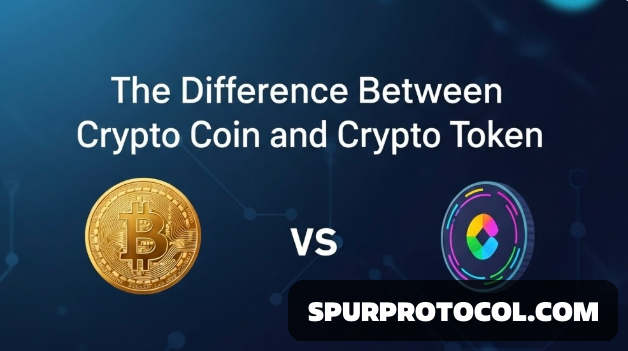The Difference Between Crypto Coin And Crypto Token
As you dive deeper into the world of cryptocurrencies, you’ll often hear two common terms thrown around, coins and tokens. While they may sound interchangeable, they represent two distinct concepts in the crypto ecosystem.
Go Back

🕒 11:46 PM
📅 Jul 25, 2025
✍️ By prejworld
Understanding the difference between a crypto coin and a crypto token is essential for anyone looking to invest, trade, or build in the blockchain space.
What Is a Crypto Coin?
A crypto coin is a digital currency that operates on its own native blockchain. Coins are primarily used as a form of money to store value, make transactions, and sometimes even pay network fees.
Examples of crypto coins:
1. Bitcoin (BTC) - runs on the Bitcoin blockchain
2. Ethereum (ETH) - runs on the Ethereum blockchain
3. Litecoin (LTC) - runs on the Litecoin blockchain
Coins are usually the backbone of their respective blockchains, and they play a major role in securing the network through mining or staking.
What Is a Crypto Token?
A crypto token is a digital asset that is built on top of an existing blockchain, rather than having its own. Tokens are created using smart contracts and serve a wide range of purposes beyond just being a currency.
Common uses of tokens:
- Utility tokens (used within a specific app or ecosystem)
- Governance tokens (used to vote on project decisions)
- Security tokens (representing ownership in real-world assets)
Examples of crypto tokens:
Uniswap (UNI) - an ERC-20 token on Ethereum
Chainlink (LINK) - also built on Ethereum
PancakeSwap (CAKE) - runs on Binance Smart Chain
Tokens rely on the infrastructure of the blockchain they’re built on, and they often require the blockchain’s native coin (like ETH for Ethereum) to pay for transactions.
Key Differences Between Coins and Tokens
1.Blockchain Ownership
Coins have their own native blockchain (e.g., Bitcoin, Ethereum).
Tokens are built on existing blockchains (e.g., Ethereum, Binance Smart Chain).
2.Transaction Fees
Coins use their own currency to pay for transaction fees.
Tokens require the native coin of the blockchain they run on (like ETH for ERC-20 tokens).
3.Primary Use Case
Coins are mostly used as digital money or store of value.
Tokens serve various purposes like governance, utility, or representing assets.
4.Examples
Coins: Bitcoin (BTC), Ethereum (ETH), Litecoin (LTC)
Tokens: Uniswap (UNI), Chainlink (LINK), USDT (Tether)
Why Does It Matter?
1. Knowing the difference between a coin and a token helps you better understand:
2. How projects are built and funded
3. Where to store your assets (some wallets only support certain chains)
4. Which assets have their own infrastructure versus those that depend on others
Investing or building, recognizing this distinction empowers you to make smarter, more informed decisions in the crypto space.
